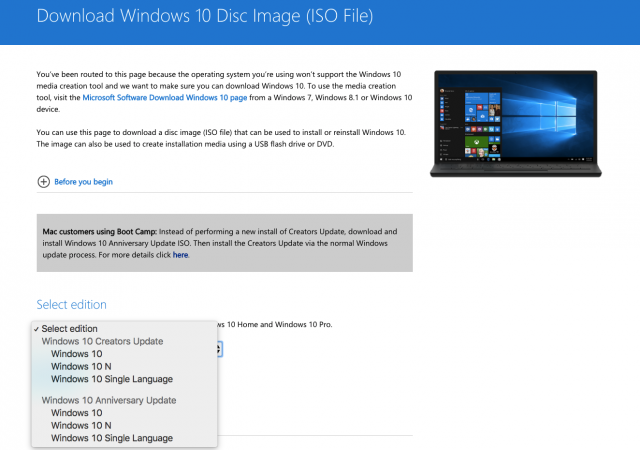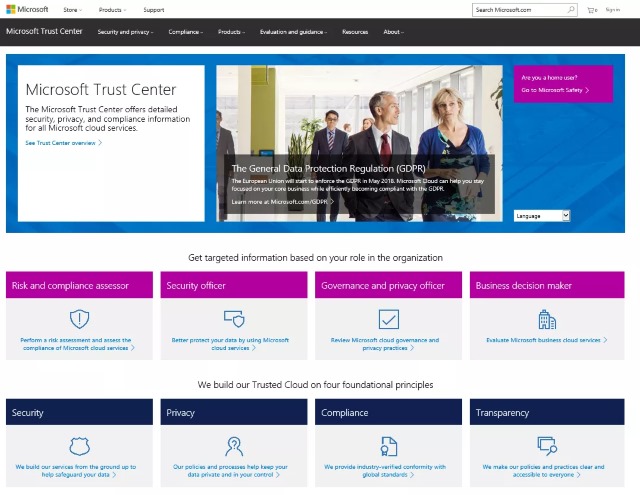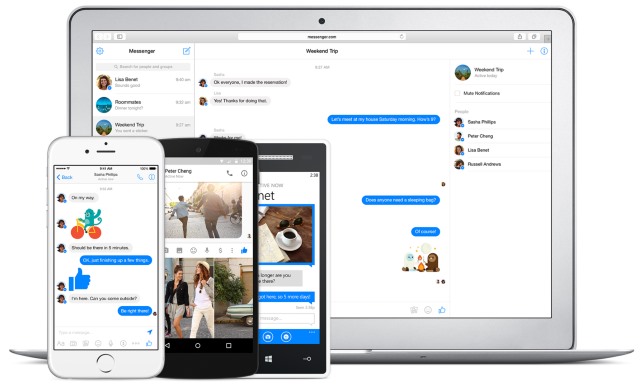
How to download Windows 10 Creators Update ISO files direct from Microsoft
Microsoft has released Windows 10 Creators Update and if you want to get your hands on the latest version of the operating system you can now download the ISO files straight from the software giant's website.
Microsoft has a dedicated landing page for Windows 10 ISO files, which lets you download both the 32-bit and 64-bit Windows 10 Creators Update, Windows 10 Creators Update N and Windows 10 Creators Update Single Language ISO files without messing around with the Media Creation Tool. However, if you click that link from a Windows device you will be redirected to the Media Creation Tool page. That's a bummer, but you can easily avoid that. Here's how.

Google Chrome gets scroll anchoring
Google Chrome is a great web browser for many reasons. Like Firefox, it is a cross-platform program based on (mostly) open source technologies, but compared to Mozilla's offering, its development moves at a much faster pace. Google is constantly pushing the envelope, creating a largely positive web browsing experience.
Today, Google introduces a new Chrome web browser feature that highlights the search giant's forward-thinking. Called "scroll anchoring," it literally "anchors" the web page, preventing the page from scrolling to the top in certain circumstances. In other words, if the user is reading text on a page, it will prevent the page from shifting and interrupting the consumption. The brilliance of this feature is its overall impact -- this annoyance has probably been experienced by most, if not all, web surfers.

Twitter Lite offers a faster Twitter experience on slow connections with Data Saver mode
After the launch of the data-saving YouTube Go beta by Google, Twitter has announced the launch of Twitter Lite. In a similar vein to YouTube Go, Twitter Lite is an acknowledgement that a huge number of people around the world are getting online using a 3G -- or even a 2G -- connection.
Twitter Lite is not an app, but a lighter version of the mobile version of the Twitter website. With no app to download, it can be used on any smartphone or tablet and an additional Data Saver mode further reduces bandwidth requirements and helps to speed up the overall experience.

UK businesses without a website are losing a lot of money
There are almost two million small and medium-sized businesses in the UK that don’t own a website, and combined they’re losing £343 billion every year.
This is according to new research by Approved Index, which claims SMEs without websites (a total of 1.98 million of them) are missing out on £173,769 per business, per year.

Netatmo Weather Station first-impressions review
If you are looking for the perfect weather app, let me save you the trouble of reading all those roundups out there: there isn't one. They are all flawed. And it's not necessarily because of their design, functionality or support, but rather what they can -- and do -- often get wrong: the forecast.
The forecast is based on information from a weather station that is usually miles and miles away. And while I have no doubt that you can get accurate predictions for that respective area, it's been my experience that things can be totally different in your area. So, how do you fix that? Enter the personal weather station.

WYSIWYG Web Builder 12 makes building websites easier than ever with new Blocks feature
Pablo Software Solutions has released WYSIWYG Web Builder 12, a major new version of its DTP-style web building tool for Windows users.
Version 12 introduces over 125 new and improved features, with one brand new addition in the form of Blocks, a new option for quickly adding predefined blocks of objects to the workspace. Other highlights include a photo collage tool, CSS flexbox support and new Easy Mode feature.

Pay-as-you-go cloud platform offers fast, convenient web design
It's a rare business that doesn't have a website these days, but for smaller companies the process of building a site and keeping it up to date can be costly and time consuming.
Texas-based startup Snaplitics is aiming to fix this with the launch of an affordable tool for creating professional websites and landing pages without having to hire developers.

Google teaches one million African people to use the web
While this might be surprising to millennials, not everyone grows up with computers. It wasn't until I was in high school that my family was able to afford a PC. While I learned quickly, I was already many years behind my more well-off peers. Nowadays computers are much less expensive, enabling more folks to own them, but there are still many people around the globe, in places like Africa, that can't afford one. This means they will fall behind the rest of the world on essential skills, such as using the web.
Google was not satisfied with this, however, so it set out to teach more people how to use the web. Last year, the search giant set a goal of training one million African people to use it. Today, the company announces that it has finally met the goal!

One in five websites uses insecure SHA-1 certificate
More than a fifth (21 percent) of all websites are still using an insecure certificate, which is leaving them open to different types of cyberattacks. This is according to a new report from cyber security experts Venafi.
The report says many sites are still using the SHA-1 certificate, which means they’re vulnerable to man-in-the-middle attacks, brute force attacks and collision attacks, all of which can expose the site’s sensitive data.

Google Chrome users on Apple macOS get enhanced Safe Browsing protection
Thanks to its Unix foundation, macOS is a rock-solid desktop operating system. While it is not infallible, there are far fewer malware threats for Apple's OS compared to, say, Windows 10. With that said, Microsoft's desktop offering is more targeted due to its monstrous market share.
As more and more consumers buy Mac computers, evildoers will have increased incentive to write malware for macOS. Luckily, users of Apple's operating system that choose to use Google Chrome for web surfing will soon be safer. You see, the search giant is improving its Safe Browsing initiative to better warn macOS users of malicious websites and attempts to alter browser settings.

Cloudbleed: Cloudflare leaks sensitive data, many major websites affected
Security researchers from Google's Project Zero have uncovered a critical bug in Cloudflare which allowed sensitive data -- like passwords, cookies and encryption keys -- from many hosted websites to leak online.
Patreon, Y Combinator, Medium, 4chan, Yelp, OKCupid, Zendesk, Uber and 23and Me are among the most-important affected websites. This security issue is so important that it is now being referred to as cloudbleed.

HTTPS now protects half of all web traffic
Websites that implement HTTPS reap a lot of benefits. Not only do they protect their users by preventing third parties from snooping on web traffic, and safeguard against content hijacking and cookie stealing, but they also enjoy a better ranking in Google as the search giant uses HTTPS as a signal in its search algorithms.
Few privacy-minded people would be happy about logging in, or entering credit card details, on a site which doesn’t afford the proper protection that HTTPS brings.

Microsoft aims to calm cloud security fears with revamped Trust Center site
The modern Microsoft places more importance on the cloud than ever before, and this means addressing the security concerns that users might have. As part of this, the company has upgraded and redesigned its Trust Center, home to a wealth of security information.
Designed to provide "support and resources for information professionals, as well as the legal and compliance community," the Trust Center is also of interest to anyone concerned about security in general and those who want to know how Microsoft is complying with laws around the world.

Google Chrome now reloads web pages faster and more efficiently than ever before
Have you ever been extremely dissatisfied with the refresh/reload performance of your web browser? Yeah, me neither. Quite frankly, I never gave much thought to it. Google has noticed, however, and it has improved the reload performance with Chrome 56.
The search giant did not discover the deficiencies of the reload feature on its own, as Facebook apparently tipped Google off to it. You see, the social network noticed that the Chrome web browser was less efficient compared to other browsers, and now Google has rectified it.

Facebook rolls out Messenger interface for web inbox
Facebook has started to roll out the Messenger.com interface as a replacement for the longstanding message inbox on the web. The latest design should feel much more familiar to folks who use the chat service on their smartphones, as it closely resembles the Android and iOS apps.
There is no official announcement yet, but you should start seeing the new interface soon on your account. It debuted nearly two years ago as a standalone website and alternative to the message inbox for folks who do not want to visit Facebook (or wish to create an account with the social network, for that matter).
